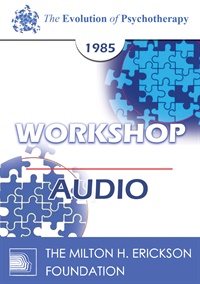
- Average Rating:
- Not yet rated
- Topic Areas:
- Workshops | Humor | Psychodrama | Therapeutic Relationship | Therapist Development | Psychotherapy
- Categories:
- Evolution of Psychotherapy | Evolution of Psychotherapy 1985
- Faculty:
- Zerka Moreno
- Duration:
- 2 Hours 37 Minutes
- Format:
- Audio Only
- Original Program Date:
- Dec 14, 1985
- Short Description:
- Because of the weight of clients difficulties, the employment of lighter areas of experience is often indicated, both for cathartic relief as well as for providing closure. The session will focus on joy, humor, tenderness.
- Price:
- $15.00 - Base Price
- Average Rating:
- Not yet rated
- Topic Areas:
- Clinical Presentations | Resistance | Psychotherapy | Therapeutic Relationship | Therapist Development
- Categories:
- Evolution of Psychotherapy | Evolution of Psychotherapy 1990
- Faculty:
- James Bugental, PhD
- Course Levels:
- Master Degree or Higher in Health-Related Field
- Duration:
- 1:00:53
- Format:
- Audio and Video
- Original Program Date:
- Dec 13, 1990
- Short Description:
- Educational Objectives: To learn interview techniques for reducing client resistances to being genuinely engaged with the therapeutic work and to be able to facilitate client inner exploration To understand the division of responsibility in which the client leads content and the therapist modulates process
- Price:
- $59.00 - Base Price
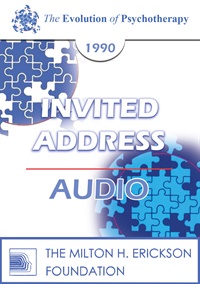
- Average Rating:
- Not yet rated
- Topic Areas:
- Invited Addresses | Borderline | Narcissism | Personality Disorders | Attunement | Therapeutic Relationship | Psychotherapy
- Categories:
- Evolution of Psychotherapy | Evolution of Psychotherapy 1990
- Faculty:
- James F. Masterson, MD | Helen Singer Kaplan, MD, PhD
- Duration:
- 1 Hour 29 Minutes
- Format:
- Audio Only
- Original Program Date:
- Dec 16, 1990
- Short Description:
- The importance of therapeutic alliance is described. Therapeutic alliance, transference, and transference acting-out are defined and distinguished from each other and the therapeutic task of helping the patient to convert transference acting-out to therapeutic alliance and transference is outlined. The differences in the form and content of the intrapsychic structure are described to show why different therapeutic techniques are necessary to establish the therapeutic alliance: Confrontation with the borderline and mirroring interpretation of narcissistic vulnerability with the Narcissistic Personality Disorder. A brief case illustrates each.
- Price:
- $15.00 - Base Price
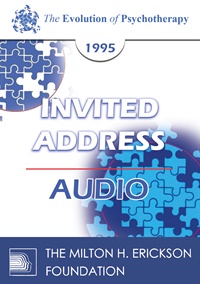
- Average Rating:
- Not yet rated
- Topic Areas:
- Invited Addresses | Existential Therapy | Therapeutic Relationship | Psychotherapy
- Categories:
- Evolution of Psychotherapy | Evolution of Psychotherapy 1995
- Faculty:
- Irvin Yalom, PhD | Miriam Polster
- Duration:
- 1:22:53
- Format:
- Audio Only
- Original Program Date:
- Dec 16, 1995
- Short Description:
- Existential psychotherapy is more properly viewed as a therapy informed by a sensibiity to existential issues, rather than as a discrete, self-contained school of therapy. It addresses the anxiety embedded in our consciousness of the parameters of existence, especially in our confrontation with death, meaninglessness, freedom, and isolation. I shall discuss these concerns, particularly those with the greatest relevance to everyday therapy practice. I shall discuss the implications of the existential sensibility for the conduct of therapy and the therapeutic relationship. Genuineness and authenticity are necessary.
- Price:
- $15.00 - Base Price
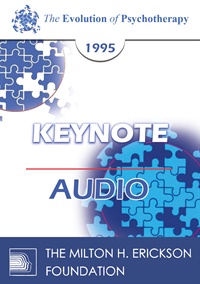
- Average Rating:
- Not yet rated
- Topic Areas:
- Keynotes | Psychotherapy | Therapeutic Relationship | Therapist Development
- Categories:
- Evolution of Psychotherapy | Evolution of Psychotherapy 1995
- Faculty:
- Gloria Steinem
- Duration:
- 1 Hour 23 Minutes
- Format:
- Audio Only
- Original Program Date:
- Dec 17, 1995
- Short Description:
- This address describes the interaction of a client and therapist and how psychotherapy encourages growth.
- Price:
- $15.00 - Base Price

- Average Rating:
- Not yet rated
- Topic Areas:
- Topical Panels | Psychotherapy | Relationships | Therapeutic Relationship
- Categories:
- Evolution of Psychotherapy | Evolution of Psychotherapy 1995
- Faculty:
- James Bugental, PhD | Arnold Lazarus, Ph.D. | Miriam Polster | Lenore Walker, EdD
- Course Levels:
- Master Degree or Higher in Health-Related Field
- Duration:
- 1:04:24
- Format:
- Audio Only
- Original Program Date:
- Dec 15, 1995
- Short Description:
- Panel 06 - Patient / Therapist Relationship Featuring James F.T. Bugental, Ph.D.; Arnold A. Lazarus, Ph.D.; Miriam Polster, Ph.D.; and Lenore Walker, Ed.D. Moderated by W Michael Munion, MA.
- Price:
- $15.00 - Base Price
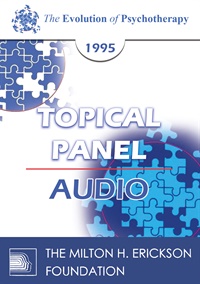
- Average Rating:
- Not yet rated
- Topic Areas:
- Topical Panels | Therapeutic Relationship | Therapist Development | Psychotherapy
- Categories:
- Evolution of Psychotherapy | Evolution of Psychotherapy 1995
- Faculty:
- William Glasser, MD | Lynn Hoffman, ACSW | Ernest Rossi, PhD | Joseph Wolpe, M.D.
- Duration:
- 54 Minutes
- Format:
- Audio Only
- Original Program Date:
- Dec 16, 1995
- Short Description:
- Panel 14 from the Evolution of Psychotherapy 1995 - Role of the Therapist / Role of the Client Featuring William Glasser, M.D.; Lynn Hoffman, A.C.S.W.; Ernest Rossi, Ph.D.; and Joseph Wolpe, M.D. Moderated by Betty Alice Erickson, MS.
- Price:
- $15.00 - Base Price
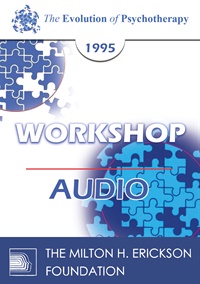
- Average Rating:
- Not yet rated
- Topic Areas:
- Workshops | Psychology | Hypnotherapy | Psychotherapy | Therapeutic Relationship
- Categories:
- Evolution of Psychotherapy | Evolution of Psychotherapy 1995
- Faculty:
- Ernest Rossi, PhD
- Duration:
- 2:49:24
- Format:
- Audio Only
- Original Program Date:
- Dec 13, 1995
- Short Description:
- The Basic Accessing Question is a simple fail-safe approach to accessing inner resources and creative problem solving by the patient with a minimum of suggestion by the therapist.
- Price:
- $15.00 - Base Price
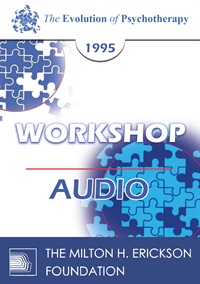
- Average Rating:
- Not yet rated
- Topic Areas:
- Workshops | Psychotherapy | Resistance | Therapeutic Relationship | Therapist Development
- Categories:
- Evolution of Psychotherapy | Evolution of Psychotherapy 1995
- Faculty:
- James Bugental, PhD | David Young, Ph.D. | Molly Sterling, Ph.D.
- Duration:
- 1 Hour 28 Minutes
- Format:
- Audio Only
- Original Program Date:
- Dec 13, 1995
- Short Description:
- The client's task is to try to be open to his/her inner experiencing, disclosing it to the therapist. A client discovers difficulties in doing so, thus disclosing the resistances which are isomorphic with the client's difficulties in life more generally. The therapist's task is to teach and monitor this process.
- Price:
- $15.00 - Base Price
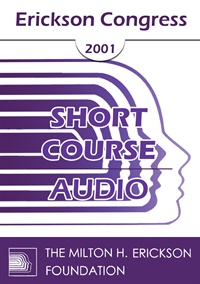
- Average Rating:
- Not yet rated
- Topic Areas:
- Short Courses | Affect | Therapeutic Relationship
- Categories:
- Erickson Congress 2001 | Erickson Congress
- Faculty:
- Sietze VanDerHeide, PsyD
- Duration:
- 1:30:51
- Format:
- Audio Only
- Original Program Date:
- Dec 06, 2001
- Short Description:
- IC01 Short Course 20 - The Ericksonian Hypnotherapeutic Relationship and Affect Regulation - Sietze Van Der Heide, PsyD The exchange of emotions in the clinical relationship is an essential aspect of the therapeutic process. Since affect is exchanged between the client and therapist at the conscious and unconscious level, Ericksonian techniques are well suited to facilitating the affective change process. This workshop will integrate contemporary models of affect regulation with Ericksonian hypnotherapy. The emphasis will be on applied techniques aimed at increasing the client's tolerance and capacity for utilization of affect.
- Price:
- $15.00 - Base Price
Please wait ...


